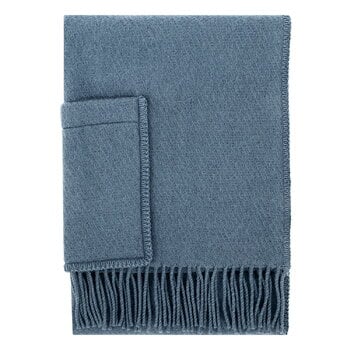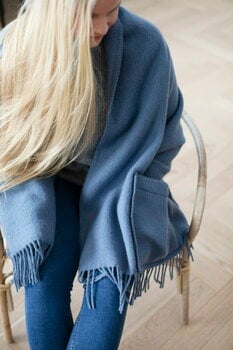The Uni pocket shawl by Lapuan Kankurit keeps you warm on the coldest winter days. The scarf is made from mulesing-free New Zealand wool which feels soft and comfortable against bare skin. Convenient pockets ensure that your hands stay warm too. The fringes complete the scarf's neat look. Throw the Uni scarf around your shoulders at home when the temperature outside starts to drop towards freezing or wrap up in a stylish shawl at the office or on the terrace. The pocket shawl is produced in a sewing factory in Lithuania.
Uni pocket shawl, rainy blue
Lapuan Kankurit
Description
The Uni pocket shawl by Lapuan Kankurit keeps you warm on the coldest winter days. The scarf is made from mulesing-free New Zealand wool which feels soft and comfortable against bare skin. Convenient pockets ensure that your hands stay warm too. The fringes complete the scarf's neat look. Throw the Uni scarf around your shoulders at home when the temperature outside starts to drop towards freezing or wrap up in a stylish shawl at the office or on the terrace. The pocket shawl is produced in a sewing factory in Lithuania.
Product details (6)
- Material
- 100% pure new wool
- Colour
- Rainy blue
- Length
- 170 cm
- Width
- 60 cm
- Weight
- 500 g
- Care instructions
- Hand wash max. 30°C or dry clean
- Product ID
Reviews (7)
4.71
Based on 7 reviews
-
C
Carole B
Feins, France
Chaud de bonne facture pur laine vierge mais déçu très de la longueur du produit De ce fait fait comme il est trop court les poches se trouvent trop hautes pour un confort des mains
357 days ago
-
L
Lahja A
Ekenäs, Finland
Ihana tuote. Yllätti positiivisesti, sillä väri vielä parempi, kuin kuvassa 💙
426 days ago
-
A
Andreas B
Oldenburg, Germany
Schönes Design, gute Qualität
315 days ago
Sustainability
The Product Sustainability Framework, our criteria of sustainable design, helps you find the most sustainable products in our selection. Read below which sustainability criteria this product has met.
Working conditions & labour 9/9
-
Equal opportunities for all employees
-
Commitment to UN Global Compact, fair compensation for all employees
-
Corporate responsibility requirements defined and communicated for suppliers
-
Systematic work for improved inclusion and well-being in the workplace
-
Transparent supply chain
-
Suppliers' compliance to a code of conduct ensured
-
Direct suppliers audited and certified
-
Compliance to the UN Guiding Principles on Business and Human Rights ensured in the supply chain
-
Support for community involvement in the supply chain
Eco-friendly production 9/9
-
Fair and resource-wise water-use in production
-
No incineration or landfilling of returned items
-
No use of endangered species as materials
-
No direct environmental emissions or waste (excl. GHGs) from production
-
The sustainability of direct suppliers' production is addressed and monitored
-
Production and material sourcing that respect biodiversity, animal rights, and natural ecosystems
-
Material-efficient and ecological packaging
-
Positive impact on nature’s well-being through operations that regenerate natural ecosystems
-
No potentially harmful chemicals used in own production
Climate impact 6/8
-
Company's direct greenhouse gas emissions identified and commitment to reduction
-
Product's carbon impact identified and commitment to reduction
-
Guidance on energy- and eco-efficient use of the product
-
Contribution to climate initiatives beyond the brand’s direct operations
-
Carbon footprint of the product calculated and goals set to reduce it
-
100 % renewable energy in own production and operations
-
Low-carbon or compensated transportation
-
Carbon neutral or carbon negative product
Sustainable materials 5/6
-
Sustainable and long-lasting material choices
-
No harmful or hazardous substances
-
Responsible raw material sourcing and production
-
Materials suited for circularity: monomaterials, recyclable finishings, renewable or recycled contents etc.
-
Ecological materials: natural, biodegradable, recyclable or recycled contents
-
Outstanding materials in terms of innovativeness, responsibility, sustainability and circularity: local production or sourcing, 100 % recycled content, C2C-certification etc.
Circular design 5/5
-
High aesthetic quality promoting long-term use of the product
-
Technically durable product design and material choices
-
Design for enduring life-long quality
-
Design and support for product maintenance, repair and upgradability
-
Innovative circular design solutions: circular service system, resale platform, remanufacturing, collection of used products, etc.








